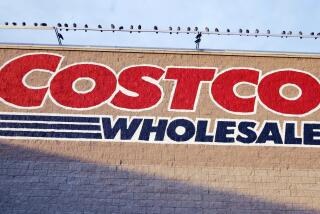Background Checks Planned at Ports
Amid heavy criticism about lax security at ports throughout the country, the Bush administration Tuesday announced a program that would conduct background checks on an estimated 400,000 workers to make sure they posed no terrorist threat.
The program, announced by Homeland Security Secretary Michael Chertoff, will first scrutinize the names of employees who work in the most sensitive port areas. They will be matched against terrorist watch lists and immigration databases.
“It is fundamental that individuals who pose a security threat do not gain access to our nation’s ports,” Chertoff said at a news conference in Washington. “The name-based checks will provide an immediate security boost while we simultaneously complete the work to implement a secure national transportation worker credential.”
Tamper-resistant identification cards eventually will be issued to about 750,000 workers, including truckers and rail employees who have unrestricted access to the nation’s ports. The first of the name checks should be completed by July.
The administration has been under fire for months about what critics call gaping security lapses at American ports. The issue was highlighted last month when a state-owned company in Dubai purchased a British firm that controlled operations at six U.S. ports.
While Chertoff was announcing the new measures, a group of Democratic lawmakers characterized port security as a colossal failure. The Dubai breakdown, they said, underscored the huge problems facing U.S. ports, including those in Los Angeles and Long Beach, which together handle 43% of America’s imported goods.
“Most Americans were shocked to discover that only 5% of the containers passing through our ports are scanned, and they demanded improvement,” said Sen. Robert Menendez (D-N.J.). “They understood, as we do, that the chances of a container containing a chemical weapon or dirty bomb were too great when we only check 5% of the cargo that comes from across the world into the United States.”
He added that the “bottom line is that we need to scan 100% of the containers coming into this country, and we need to get there sooner rather than later.”
Lawmakers have been pressuring Chertoff to increase port security since congressional investigators found fault with the number of on-site inspections and lack of equipment to detect radioactivity.
“Port security has been the neglected stepchild of homeland security,” said Sen. Charles E. Schumer (D-N.Y.). “We must secure our ports, no matter who owns the shipping companies, because nobody is doing enough.”
In Los Angeles, longshoremen and truckers said they would cooperate, but they had several concerns.
International Longshore and Warehouse Union leaders have agreed to turn over membership lists that would be compared with names on the federal government’s terrorist watch list.
But ILWU spokesman Steve Stallone said the union wanted a timely appeals process in place so cases of mistaken identity could be resolved quickly.
“We are always concerned about workplace safety and security and protecting our workers,” he said, “but it’s got to be balanced with the workers’ civil rights.”
Stephanie Williams, senior vice president of the California Trucking Assn., the lobbying arm for 2,500 trucking companies in the state, expressed similar concerns, saying, “The devil will be in the details.”
Federal law already requires trucking companies to run criminal background checks on their drivers, Williams said, but she added that her association nevertheless backed the plan.
“We all want to support this. The cards are a great idea,” she said, but “we don’t want to preclude a driver for something they did in their 20s. The drivers have to be treated fairly. If they are going to want to fire someone like that, we’re going to have problems.”
Williams also expressed concern over how quickly the government would work through cases in which drivers were flagged for investigation.
More to Read
Sign up for Essential California
The most important California stories and recommendations in your inbox every morning.
You may occasionally receive promotional content from the Los Angeles Times.











